This post is a summary of our recent report "Mapping the Charitable Funding Landscape for Animal Welfare in Africa: Insights and Opportunities for Farmed Animal Advocacy". We only included the most relevant parts for EA Forum readers here and invite interested readers to consult the report for more details and insights.
TL;DR
Funding towards the farmed animal advocacy movement in Africa has grown significantly over the past years, especially from EA-aligned funders. Despite these increases, farmed animal advocacy remains underfunded.
We hope that this report can help us and other stakeholders to more rapidly and effectively build the farmed animal advocacy movement in Africa. We aim to use and amplify the growing momentum identified in this report and call on any individual or organisations interested in contributing to this cause to contact us and/or increase their resources and focus dedicated towards farmed animal welfare in Africa.
Motivation
Industrial animal agriculture is expanding rapidly in Africa, with the continent projected to account for the largest absolute increase in farmed land animal numbers of any continent between 2012 and 2050 (Kortschak, 2023).
Despite its vast scale, the issue is highly neglected by charitable funding. Lewis Bollard (2019) estimated that farmed animal advocacy work in Africa received only USD 1 million in 2019, less than 1% of global funding for farmed animal advocacy. Farmed Animal Funders (2021) estimated funding to Africa at USD 2.5 million in 2021, a significantly higher but still very low amount. Accordingly, activists and organisations on the ground cite a lack of funding as the main bottleneck for their work (Tan, 2021).
Since 2021, Animal Advocacy Africa (AAA) has actively worked towards strengthening the farmed animal advocacy movement in Africa, with some focus on improving funding. With this report, we aim to understand the funding landscape for farmed animal advocacy in Africa in depth, identifying key actors, patterns, and trends. Notably, we focus on charitable grants and exclude any government funding that might be relevant as well. Our research aims to build transparency and enhance information on what is being done to help animals in Africa, which can help various stakeholders to make better decisions. While we focus on farmed animals, we also provide context on other animal groups. We hope that the findings from our analysis can contribute to funders shifting some of their resources from less neglected and potentially lower-impact projects to more neglected and potentially higher-impact ones.
Data basis
Based on the funding records of 131 funders that we suspected might have funded African animal causes in the past, we created a database of 2,136 records of grants towards animal projects in Africa. This grant data allowed us to base our analysis on real-world data, which provides an important improvement to previous research, which was typically based on self-reported surveys with funders and/or charities.
Findings
Overall funding levels
We estimate at an 80% confidence level that the funders in scope for this analysis granted a total of USD 25 to 35 million to animal-related causes in Africa in 2020. These grants had substantially increased from 2018 to 2020.
Funding for animal causes in Africa shows interesting patterns that contrast, to a certain extent, with trends observed in the animal advocacy movement globally (Animal Charity Evaluators, 2024). Wild animal and conservation efforts receive the most funding. Notably, the projects in this category do not follow the wild animal suffering approach typically discussed in Effective Altruism (EA), but have a more traditional conservationist focus. Working animals are the second most funded animal group, reflecting their significance in Africa. This is a strong contrast to the focus on companion animals in wealthier societies, which only receive a very minor share of funding in Africa. Farmed animals received only 1.7% of the total funding towards helping animals in Africa by the funders in scope in 2020.
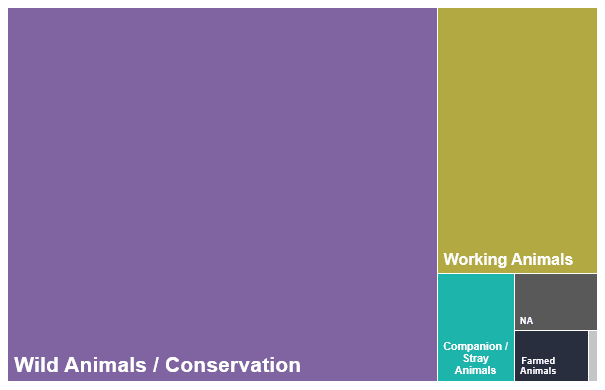
Based on this share, we expect the funders in scope for this analysis to have granted around USD 0.6 million to farmed animal causes in Africa in 2020, with our 80% subjective confidence interval ranging from USD 0.2 to 1.0 million.
However, we observe a significant increase in funding towards farmed animals in Africa over time, particularly from 2020 onwards.
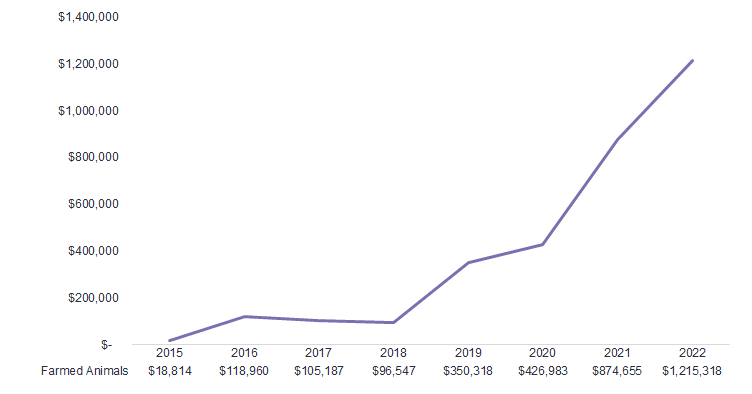
Accounting for these increases, we estimate at 70% confidence that total farmed animal funding for Africa was between USD 1.5 and 3 million in 2022, including unknowns such as funders not included in this analysis and the graph above.
The report also reveals a strong and growing concentration of African farmed animal advocacy funding among a few major EA-aligned funders, underscoring the EA movement's crucial role for the cause. Major funders like Animal Charity Evaluators, Effective Altruism Funds, the ProVeg Grants Program, and The Humane League / Open Wing Alliance have significantly ramped up their contributions in recent years.
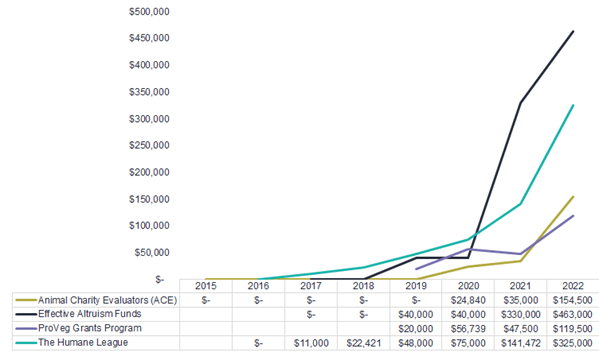
Despite these increases, farmed animal advocacy remains underfunded. Farmed Animal Funders (2021) cites figures of USD 91 and 70 million for North America and Europe, as well as USD 15 and 10 million for Asia and Latin America.
A variety of major players in the farmed animal advocacy movement thus call for a stronger focus on neglected regions like Africa. Farmed Animal Funders (2021) reports that “there is a discrepancy between FAF members’ geographic interests and the locations of their actual grantees”. According to Rethink Priorities (2023), in an optimal scenario, key decision-makers in the effective animal advocacy community would allocate 9.1% and 8.1% of total EAA resources respectively to Sub-Saharan Africa as well as North Africa and the Middle East. These shares are much larger than in the actual distribution, as explained above. The key decision-makers also think that “experts on the developing world or specific neglected but populous countries” are the most pressing talent gap in the community. Additionally, Charity Entrepreneurship (2023) writes that they are “concerned that funders may neglect more exploratory work and certain regions (e.g. Africa) due to limited resources”.
Specific funding purposes
The table below shows the largest grants to African farmed animal projects between 2015 and 2022.
| Funder | Recipient/Partner Organisation | Year | Amount USD | Country |
|---|---|---|---|---|
| A Well-Fed World | International Fund for Africa | 2020 | 195,000 | |
| Open Philanthropy Project | Mount Kenya University | 2021 | 167,766 | Kenya |
| Effective Altruism Funds | Africa Network for Animal Welfare (ANAW) | 2022 | 105,000 | |
| Effective Altruism Funds | Africa Network for Animal Welfare (ANAW) | 2022 | 100,000 | |
| Effective Altruism Funds | Africa Network for Animal Welfare (ANAW) | 2021 | 96,000 | |
| A Well-Fed World | International Fund for Africa | 2016 | 91,750 | |
| A Well-Fed World | International Fund for Africa | 2017 | 91,000 | |
| Effective Altruism Funds | Animal Advocacy Africa | 2021 | 66,000 | South Africa |
| Compassion in World Farming | Africa Network for Animal Welfare (ANAW) | 2021 | 55,013 | Kenya |
| Animal Charity Evaluators | Animal Advocacy Africa | 2022 | 50,000 | South Africa |
| Effective Altruism Funds | Healthier Hens | 2022 | 50,000 | Kenya |
| The Humane League | Southern African Faith Communities’ Environment Institute (SAFCEI) | 2019 | 48,000 | South Africa |
| The Humane League | Africa Network for Animal Welfare (ANAW) | 2022 | 44,429 | Kenya |
| The Humane League | National Youth Network on Climate Change (NYNCC) | 2022 | 44,429 | Malawi |
| The Humane League | Animal Law Reform South Africa | 2022 | 44,429 | South Africa |
| The Humane League | Coalition of African Animal Welfare Organisations (CAAWO) | 2022 | 44,429 | South Africa |
| The Humane League | Southern African Faith Communities’ Environment Institute (SAFCEI) | 2022 | 44,429 | South Africa |
| The Humane League | Education for Africa Animal Welfare (EAAW) | 2022 | 44,429 | Tanzania |
| The Humane League | Meru Animal Welfare Organization | 2022 | 44,429 | Tanzania |
| Effective Altruism Funds | One Health and Development Initiative | 2022 | 40,000 | Nigeria |
| Effective Altruism Funds | Coalition of African Animal Welfare Organisations (CAAWO) | 2021 | 40,000 | South Africa |
| Effective Altruism Funds | Credence Institute | 2020 | 40,000 | South Africa |
| Effective Altruism Funds | Southern African Faith Communities’ Environment Institute (SAFCEI) | 2019 | 40,000 | South Africa |
Analysing all grants, we find that funding for farmed animals is not clearly focused on one specific type of intervention. In 2020, the majority of funding was directed at plant-based outreach, education, and food provision programmes. Looking at the whole 2015-2022 period, we found that corporate outreach also received a substantial share of farmed animal funding, mostly dominated by cage-free campaigns. To a lesser extent, research and capacity building projects attracted significant shares as well. Political and legislative work received only a smaller share of the funding.
South Africa took the leading role on the continent when it comes to farmed animal work, attracting ~65% of all farmed animal funding in 2020 and more than 30% between 2015 and 2022. This fact could be attributed to the country's more developed and industrialised economy and farming sector. This supports our perspective that most funding for farmed animal causes is aimed at addressing current industrial animal agriculture instead of preventing its emergence, the cause that we are focusing our efforts on (Kortschak, 2023). Kenya also received a substantial share of funding towards farmed animal work in Africa. Apart from these two clear leaders, Benin, Ghana, Malawi, Nigeria, Tanzania, Uganda, and Zimbabwe were further noteworthy recipient countries.
We found 83 organisations that received some funding for farmed animal work in Africa by the funders in scope in 2015-2022. Notably, our own organisation, Animal Advocacy Africa, despite being relatively new and small, has received a significant share of total African farmed animal funding. This highlights the low overall funding levels in this sector.
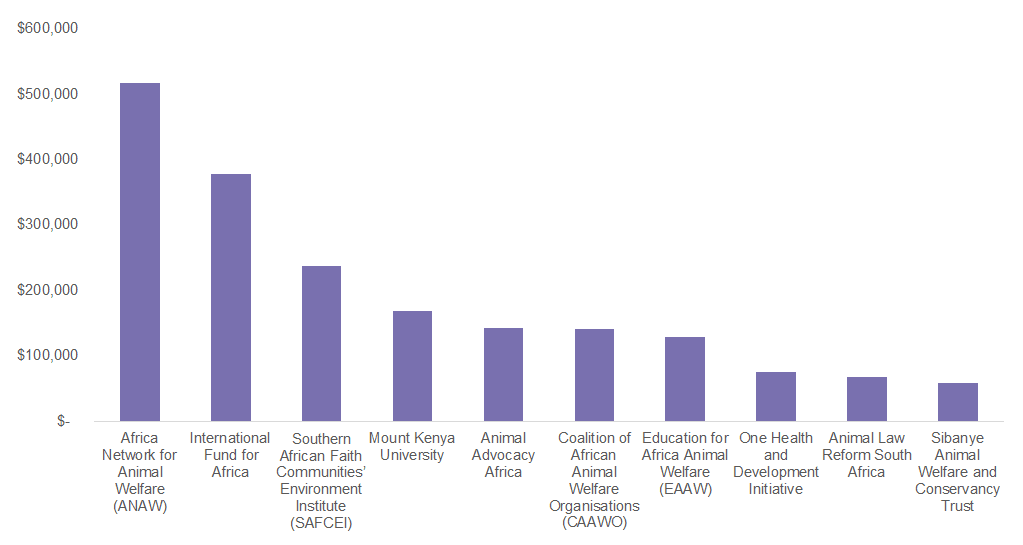
We have had interactions with most of the organisations in the top 30 farmed animal grant recipients. Some have been part of our capacity-building programme, others only took part in our pilot programme, while others only engaged with us in other capacity (e.g. for research purposes). We played a role in some organisations securing significant grants in the farmed animal space and suspect that our work at least somewhat contributed to the increase in funding towards farmed animal advocacy in Africa.
Next steps
The findings from this report aim to encourage funders to shift more of their resources to farmed animal work in Africa.
Overall, we hope that this report can help us and other stakeholders to more rapidly and effectively build the farmed animal advocacy movement in Africa. We aim to use and amplify the growing momentum identified in this report and call on any individual or organisations interested in contributing to this cause to contact us and/or increase their resources and focus dedicated towards farmed animal welfare in Africa.


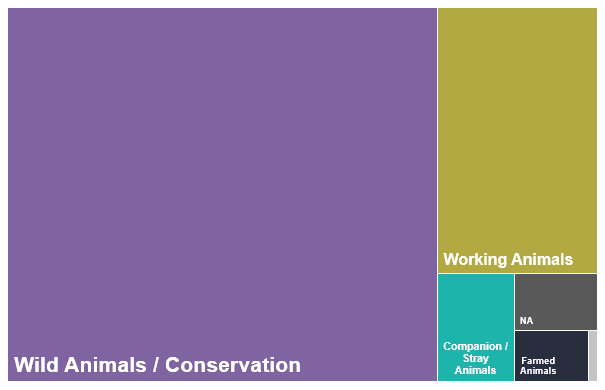
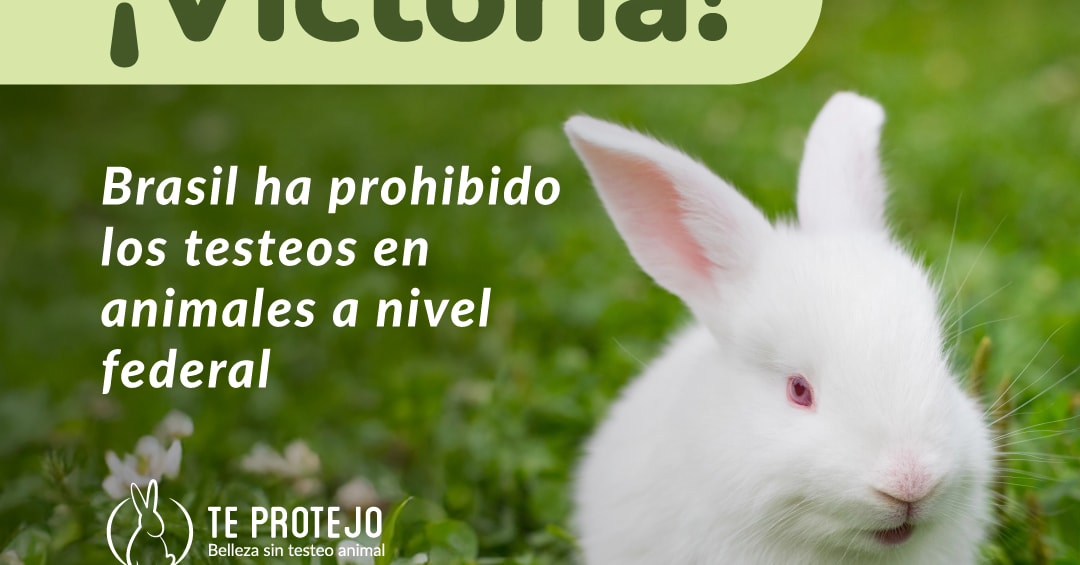
This is very good research about funding dynamics in Africa. Thank you AAA for the commendable work you are doing in helping the farmed animal welfare movement in Africa- I hope more funding will be allocated to Africa, especially to policy and legal intervention work.